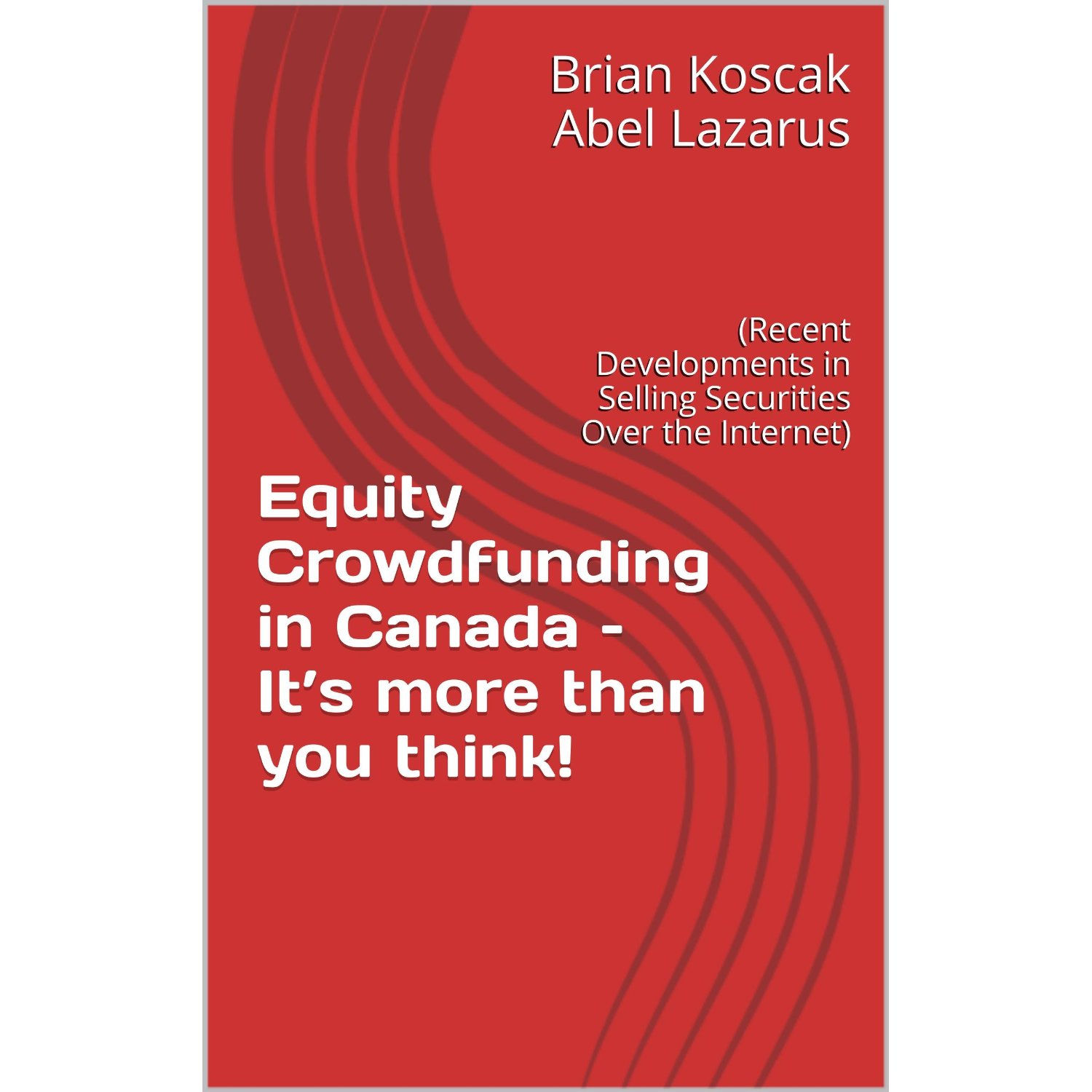 Not every type of issuer can raise capital under the existing and proposed Equity Crowdfunding exemptions in Canada. This article discusses the availability of certain proposed and existing Equity Crowdfunding exemptions in Canada for issuers looking to raise capital and the published rationale by certain participating Canadian Securities Administrators (CSA) where such exemptions are proposed or sought to be amended.
Not every type of issuer can raise capital under the existing and proposed Equity Crowdfunding exemptions in Canada. This article discusses the availability of certain proposed and existing Equity Crowdfunding exemptions in Canada for issuers looking to raise capital and the published rationale by certain participating Canadian Securities Administrators (CSA) where such exemptions are proposed or sought to be amended.
You can obtain a copy of the proposed Equity Crowdfunding Exemption and changes to the OM Exemption (defined below) proposed by the Ontario Securities Commission (the OSC) and other CSA members here and the proposed Start-Up Equity Crowdfunding Exemption here.
The “OM Exemption” refers to the offering memorandum prospectus exemption set out in Section 2.9 of National Instrument 45-106 – Prospectus and Registration Exemptions. You can read a prior article that explains the OM Exemption in a here and some of the issues and concerns involving the OSC’s proposed changes to the OM Exemption here.
Below is a chart that sets out the availability of the proposed and existing Equity Crowdfunding exemptions in Canada for certain types of issuers.
| Equity Crowdfunding Proposed in ON, QB, SK, MB NB and NS | Start-Up Equity Crowdfunding Proposed in QB, SK, MB NB and NS | OM Exemption Proposed ON/NB model | OM Exemption- Existing BC and AB models |
| Available for:
reporting and non-reporting issuers |
Available for:
non-reporting issuers only |
Available for:
reporting and non-reporting issuers |
Available for:
reporting and non-reporting issuers |
| Unavailable for:1. investment funds
2. real estate non-reporting issuers 3. blind pools 4. non-Eligible Canadian issuers 5. non-compliant issuers who previously used the exemption 6. related issuers of the funding portal |
Unavailable for:1. reporting issuers
2. investment funds 3. issuers whose head office is outside of the participating jurisdictions 4. if a person or company in an issuer group used the exemption more than twice in a calendar year 5. no person or company in the issuer group has used the exemption more than twice in a calendar year |
Unavailable for:1. investment funds
2. related issuers |
Unavailable for:1. N/A |
Equity Crowdfunding – Under Proposed Prospectus Exemptions
Below are six proposed restrictions that you need to consider under the proposed Equity Crowdfunding exemption.
(a) Equity Crowdfunding Proposal
Both reporting and non-reporting issuers would be able to use the proposed exemption. The idea is that both public and private small and medium-sized enterprises (SMEs) should be able to rely on the exemption to stimulate capital formation. This may be particularly useful to reporting issuers who are finding it difficult to raise capital through more traditional means in the current economic climate. Moreover, reporting issuers should not have fewer capital raising options than non-reporting issuers since reporting issuers have a continuous disclosure record which is publicly available on SEDAR at www.sedar.com. However, certain issuers would be prohibited from using the exemption as discussed below.
1. No investment funds – Investment funds would be excluded. Certain CSA members believe this is consistent with the objective of facilitating capital raising for start-ups and SMEs. Moreover, the CSA is currently undertaking a separate policy project involving the modernization of product regulation for investment funds which it is separate and apart from this project.
2. No real estate non-reporting issuers – The exemption would not be available for real estate issuers that are non-reporting issuers (i.e., private real estate issuers. Reporting issuers that are real estate issuers (i.e., public real estate issuers) would be able to use the exemption. Real estate issuers include: (a) real estate investment trusts, mortgage investment entities and issuers that primarily invest in, or develop, real estate, or derive their revenue primarily from investments in real estate.
Certain CSA members have concerns with the sale of real estate securities by non-reporting issuers in the exempt market and believe real estate does not stimulate capital formation for SMEs. The proposed Companion Policy to the Equity Crowdfunding Exemption (the Proposed CP) states that the exclusion is intended to capture non‐reporting issuers whose primary business is focused on real estate. It is not intended to capture an issuer with a primary business that is not focused on real estate, but that invests in or develops real estate in the furtherance of its primary business. For example, an issuer that is developing a bakery business might need to rent or purchase real estate in order to establish retail bakery locations. The proposed Companion Policy further states that the regulators would not generally consider real estate activity that is ancillary to the issuer’s primary business as precluding the issuer from being able to rely on the exemption.
3. No blind pools – Blind pools or issuers without a business plan are excluded from using the proposed exemption. Issuers without a plan that sets out the proposed business, its goals or milestones and the plan for reaching those goals or milestone is too esoteric for investors who need specifics in order to make an informed investment decision. This is consistent with the focus on SMEs and existing or start-up businesses having a plan since blind pools raise additional investor protection concerns.
4. No non-Eligible Canadian issuers – Only eligible Canadian issuers can raise capital under this proposed exemption. “Eligible Canadian issuers” are those where: (a) the issuer, and if applicable, the parent and the principal operating subsidiary of the issuer, are incorporated or organized under the laws of Canada or a jurisdiction of Canada; (b) the head office of the issuer is situated in Canada; and (c) a majority of the directors of the issuer are resident in Canada.
5. No non-compliant issuers who previously used the exemption – Issuers who have previously raised capital in reliance on the proposed Equity Crowdfunding Exemption and who are not in compliance with sections 23 (annual financial statements), 24 (annual disclosure of use of proceeds), 25 (notice of specified events), 26 (period of time for providing ongoing disclosure) and 27 (books and records) of the proposed exemption cannot use it for future capital raises.
6. No related issuer of the funding portal – A registered funding portal and every registered individual of the registered funding portal must not allow an issuer access to the funding portal’s website if the issuer is a “related issuer” of the registered funding portal. A “related issuer” is described in National Instrument 33-105 Underwriting Conflicts (NI 33-105) and generally refers to a situation where there is cross-ownership between an issuer and the registered funding portal. Subsection 1.2(2) of NI 33-105 provides that an entity is a related issuer to another entity if one of them is an “influential securityholder” of the other, or each of them is a related issuer of the same third party.
If a registered funding portal or a related registered individual proposes to allow an issuer that is a connected issuer access to the registered funding portal, the registered funding portal should ensure that the issuer’s offering documents include the disclosure required by Appendix C to NI 33-105. The definition of a “connected issuer” is described in NI 33-105 and generally refers to a situation where an issuer is not a related issuer of the registrant, but has some other relationship with the registrant that would cause a reasonable investor to question whether the registrant and the issuer are independent of each other for purposes of the distribution.
(b) Start-Up Equity Crowdfunding Proposal
Below are five the restrictions on issuers who seek to raise capital under the proposed Start-Up Equity Exemption.
1. Issuer can only distribute its own securities – An issuer can only use this exemption to sell securities from its own treasury and it is not available to selling shareholders.
2. Issuer is not a reporting issuer – This exemption is for start-ups only and not established reporting issuers hence the exemption is unavailable to reporting issuers.
3. Issuer is not an investment fund – See comments above under “(a) Equity Crowdfunding Exemption – No investment funds”.
4. Head office of the issuer is located in any of the participating jurisdictions – This is different than the Eligible Canadian issuer requirement under the proposed Equity Crowdfunding Exemption since the issuer is not required to be established under Canadian law or to have a majority of its directors as Canadian residents. An issuer is only required to have its head office in one of he participating jurisdictions.
5. No person or company in the issuer group has used the exemption more than twice in a calendar year – This is to prevent persons or related issuers of an issuer group from circumventing the limits of the exemption by raising capital through various entities.
(c) Offering Memorandum Exemption – Proposed ON/NB model
Below are the restrictions on issuers who seek to raise capital under the OM Exemption as proposed by the Ontario Securities Commission and New Brunswick Securities Commission.
1. No investment funds – See comments above under “(a) Equity Crowdfunding Exemption – No investment funds”.
2. No related issuers of the dealer – See comments above under “(a) Equity Crowdfunding Exemption – No related issuer of the funding portal” although reference should be made to an EMD and not a funding portal where the EMD is not a funding portal. Certain CSA members believe that it is unlikely that a start-up or SME would find it worthwhile to establish a related registrant to sell its securities. Moreover, the OSC states that, through its compliance reviews, it continues to identify significant compliance issues with EMDs that distribute securities of “related issuers” and “connected issuers” as those terms are defined in NI 33-105. As the exemption will expand the class of investors with whom an EMD may deal to include retail investors, the OSC is concerned that these issues may be exacerbated if the EMD is related to the issuer. Accordingly, the OSC has proposed that the exemption not be available for a distribution by a registrant of securities of a related issuer.
No such restrictions exist under the existing form of the OM Exemption or proposed by any CSA member other than Ontario and New Brunswick as discussed above.
Equity Crowdfunding – Under Existing Prospectus Exemptions
There are no restrictions on the type of issuer that can raise capital and sell its securities under the existing OM Exemption or under the existing accredited investor exemption through a registered EMD.
I note that the British Columbia Securities Commission (BCSC) has publicly stated that EMDs selling securities on the internet under the OM Exemption is Equity Crowdfunding.
Final thoughts
In summary, not all issuers can raise capital under the proposed and existing Equity Crowdfunding exemptions in Canada. Issuers need to make sure they can rely on these exemptions and, if they cannot, as discussed above for certain types of issuers, readers are encouraged to submit a comment letter to their local CSA member and discuss their concerns before the end of the comment period on June 18, 2014.
* * *
Disclaimer
This blog is not intended to create, and does not create an attorney-client relationship. You should not act or rely on information on this blog post without first seeking the advice of a lawyer. This material is intended for general information purposes only and does not constitute legal advice. For legal issues that arise, the reader should consult legal counsel.
 Brian Koscak is a Partner at Cassels Brock & Blackwell LLP located in Toronto, Ontario and Chair of the Private Capital Markets Association of Canada (formerly, the Exempt Market Dealers Association of Canada). Brian is also a member of the Ontario Securities Commission’s Exempt Market Advisory Committee and Co-Chair of the Equity Crowdfunding Alliance of Canada. Brian can be reached by phone at 416-860-2955, by e-mail at bkoscak@casselsbrock.com or on twitter @briankoscak. Brian also regularly writes about Canadian securities law matters on his personal blog at www.briankoscak.com.
Brian Koscak is a Partner at Cassels Brock & Blackwell LLP located in Toronto, Ontario and Chair of the Private Capital Markets Association of Canada (formerly, the Exempt Market Dealers Association of Canada). Brian is also a member of the Ontario Securities Commission’s Exempt Market Advisory Committee and Co-Chair of the Equity Crowdfunding Alliance of Canada. Brian can be reached by phone at 416-860-2955, by e-mail at bkoscak@casselsbrock.com or on twitter @briankoscak. Brian also regularly writes about Canadian securities law matters on his personal blog at www.briankoscak.com.





Hi Brian,
Great summary! I believe that the start-up exemption was also proposed by the BCSC, March 20, 2014 with request for comment through June 18, 2014.
Keep on keeping us in the loop!
Len